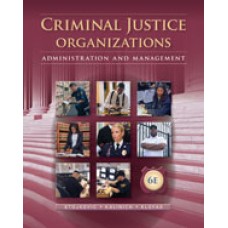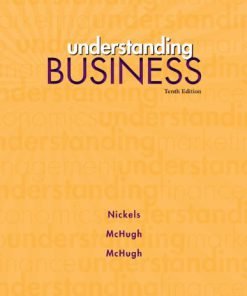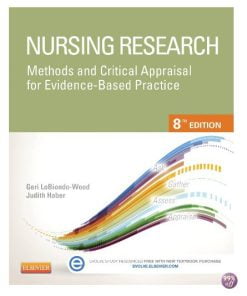Test Bank for Criminal Justice Organizations Administration and Management, 6th Edition
$35.00 Original price was: $35.00.$26.50Current price is: $26.50.
Test Bank for Criminal Justice Organizations Administration and Management, 6th Edition
This is completed downloadable of Test Bank for Criminal Justice Organizations Administration and Management, 6th Edition
Product Details:
- ISBN-10 : 1285459016
- ISBN-13 : 978-1285459011
- Author: Stan Stojkovic, David Kalinich, John M. Klofas
Packed with cutting-edge coverage and up-to-the-minute research, CRIMINAL JUSTICE ORGANIZATIONS: ADMINISTRATION AND MANAGEMENT, 6th Edition, delivers a thoroughly modern introduction to the management techniques appropriate to each area of the criminal justice system. The book is known for its thoroughness, accessibility, and practicality. By focusing on both the “hows” and “whys” of management techniques, it equips readers with a solid understanding that will serve them well as they face challenges in their own career. Completely current, this edition includes relevant statistics, insight from actual Criminal Justice professionals, and coverage of such key topics as civil liability, political power, leadership, ethics, employee rights, and more.
Table of Content:
- Part I: The Nature of Criminal Justice Organizations
- Ch 1: Basic Concepts for Understanding Criminal Justice Organizations
- Learning Objectives
- Vignette
- Criminal Justice Administration: History
- What is an Organization?
- What is Management?
- What is Leadership?
- Open-System Theory
- Complex Goals
- Complex Environment
- Complex Internal Constituencies
- Summary
- For Discussion
- For Further Reading
- Ch 2: Structure of Criminal Justice Organizations
- Learning Objectives
- Vignette
- Overview of Organizational Structure
- Mission, Policies, and Procedures
- Policies and Procedures in Organizations
- Budgeting in Organizations
- Informal Structures in Organizations
- Organizational Frames
- Summary
- For Discussion
- For Further Reading
- Ch 3: The Criminal Justice System in Its Environment
- Learning Objectives
- Vignette
- Defining the Environment of the Criminal Justice System
- The Political Environment
- Task Environment Elements Specific to the Criminal Justice System
- Environmental States
- Organizational Response to the Environment
- Managing Environmental Forces
- Summary and Implications for Administrators
- For Discussion
- For Further Reading
- Part II: Individuals in Criminal Justice Organizations
- Ch 4: Problems of Communication
- Learning Objectives
- Vignette
- Basic Theory of Communication
- Communication in Organizations
- Communication Roles for Criminal Justice Practitioners
- Developing Informal Communication Networks
- Implications for Criminal Justice Managers
- Communication and Technology
- Ethical Problems in the Communication Process
- Summary
- For Discussion
- For Further Reading
- Ch 5: Motivation of Personnel
- Learning Objectives
- Vignette
- Motivation Defined
- Understanding Organizational Theory and Motivation from a Historical Point of View
- Theories of Motivation
- Prescriptions for Criminal Justice Management
- Summary
- For Discussion
- For Further Reading
- Ch 6: Job Design
- Learning Objectives
- Vignette
- What is Job Design?
- Engineering and Efficiency in Job Design
- Taylorism in the Human Services
- Taylorism in Criminal Justice
- Responses to Job Characteristics
- Job Design Theory
- Job Redesign Programs
- Job Redesign in Criminal Justice and Other Human Services
- Job Design and the Community
- Summary
- For Discussion
- For Further Reading
- Ch 7: Leadership
- Learning Objectives
- Vignette
- Leadership Defined
- Theories of Leadership
- Leadership Research in Criminal Justice
- Leadership Education: The California Department of Corrections Experience
- Criminal Justice Leadership: A Brief Word on Organizational Culture
- Summary
- For Discussion
- For Further Reading
- Ch 8: Personnel Evaluation and Supervision
- Learning Objectives
- Vignette
- Criminal Justice Administration: The Search for Goal Consensus
- Organizational Structure and Employee Evaluation and Supervision
- Models of Employee Supervision
- Is the Human Service Model Possible?
- Guidelines for Performance Evaluation and Supervision
- Rights of Criminal Justice Employees
- Summary
- For Discussion
- For Further Reading
- Part III: Group Behavior in Criminal Justice Organizations
- Ch 9: Occupational Socialization
- Learning Objectives
- Vignette
- Occupational Socialization
- Organizational Culture
- The Socialization Process
- Stages of Socialization
- A Model of Influences
- Problems in the Socialization Process
- Socialization and the Police
- Socialization in Corrections
- Socialization and Community Expectations
- Strategies for Socialization: Implications for Administrators
- Ethical Consideration in the Socialization Process
- Summary
- For Discussion
- For Further Reading
- Ch 10: Power and Political Behavior
- Learning Objectives
- Vignette
- Power Defined
- Types of Power and Authority
- Consequences of Power Relations
- The Legitimacy of Power and Political Behavior
- Effective Types of Power
- Summary
- For Discussion
- For Further Reading
- Ch 11: Organizational Conflict
- Learning Objectives
- Vignette
- Conflict Defined
- Types of Conflict
- Conflict Management
- The Role of Conflict in Organizations
- Summary
- For Discussion
- For Further Reading
- Part IV: Processes in Criminal Justice Organizations
- Ch 12: Decision Making
- Learning Objectives
- Vignette
- What is a Decision?
- Decision-Making Theory: From Rationality to the Garbage Can
- Characteristics of Decision Makers
- Decision-Making Styles
- Characteristics of Information
- Discretion
- Prediction
- Improving Criminal Justice Decisions
- Ethical Considerations in Decision Making
- Summary
- For Discussion
- For Further Reading
- Ch 13: Organizational Effectiveness
- Learning Objectives
- Vignette
- What is Organizational Effectiveness?
- Theories of Organizational Effectiveness
- Methods of Assessing Effectiveness
- Variable Analysis in Criminal Justice
- Ethical Considerations in Assessing Organizational Effectiveness
- Summary
- For Discussion
- For Further Reading
- Ch 14: Change and Innovation
- Learning Objectives
- Vignette
- Why Change Occurs
- The Process of Organizational Change
- Planning in Criminal Justice
- Resistance to Change
- Organizational Development
- Unintended Consequences of Change
- Ethics and Organizational Change
- Implications for Criminal Justice Managers
- Summary
- For Discussion
- For Further Reading
- Ch 15: Research in Criminal Justice Organizations
- Learning Objectives
- Vignette: Project Dare and Research
- “Knowledge for What?”
- Criminal Justice Organizations and Knowledge Utilization
- The Researcher and Knowledge Utilization
- The Nature of Social Science Research and Knowledge Utilization
- Data and the Utilization of Knowledge
- In-House Research
- Knowledge as Power
- Knowledge as Understanding
- Knowledge and Research Partnerships
- Knowledge and Failure
- Advances in Research in Criminal Justice
- Knowledge and the Future of Criminal Justice Administration
- Summary
- For Discussion
- For Further Reading
- References
- Index
People Also Search:
criminal justice organizations administration and management 6th edition
criminal justice organizations administration and management 6th edition
criminal justice organizations administration and management 6th edition pdf
Related products
Test Bank
Test Bank for Decision Support and Business Intelligence Systems, 9th Edition: Efraim Turban












